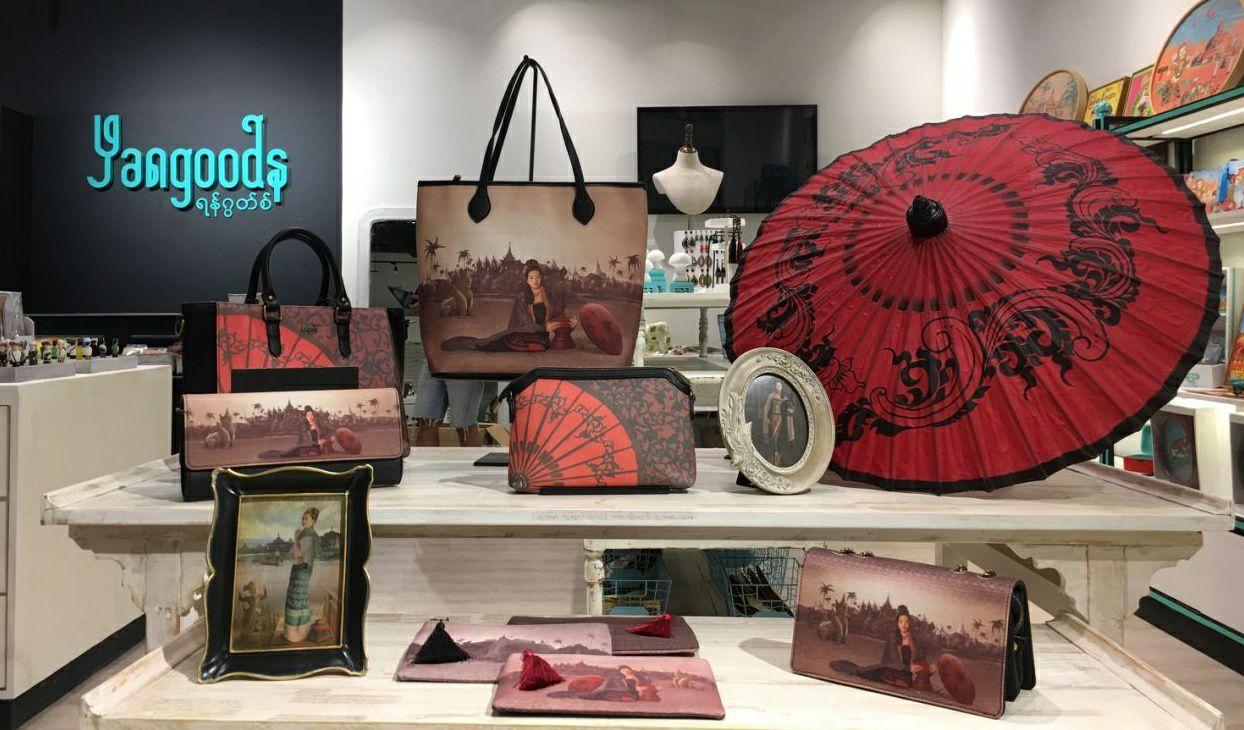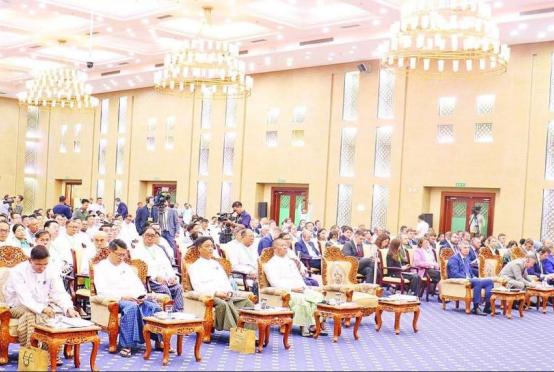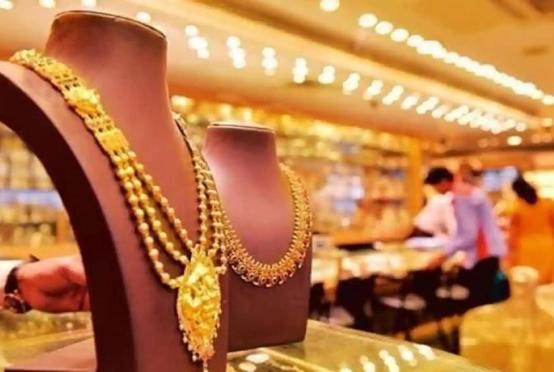YANGON, MYANMAR
Jean Curci, a successful and innately innovative French entrepreneur, offers valuable advice on businesses and enterprise for the youth of Myanmar—with plenty of proof to back it up.
In his colorful office filled with Myanmore awards and boardgames, Curci shared his experiences, inspirations, and motivations for his many businesses. Curci has been living and working in East Asia for around 11 years, from Japan to India and now in Myanmar - for six years. He has started businesses in the countries, over many different fields, and he describes himself as an entrepreneur, through and through. From Yangoods, Mojo Lounge, Blue Belu Studios, to Dagon Dice, Jean Curci is behind many famous names.
A Delicate Balance
Many of his businesses contain an stimulating blend; a concotion of times and a mixture of cultures. Mojo Lounge, now closed, was a successful fusion of European and Vietnamese cuisines, while Yangoods, co-founded by Jean and three others, is a fashion line inspired by Myanmar's rich cultural heritage with a dash of modernity.
When asked what other industries could benefit from having the touch that he brings into his work, he said there are two evident industries: tourism and fashion. He said that tourism has a massive potential and that there is plenty of growth room and opprotunity for Myanmar to catch up to the figures boasted by its neighbors such as Thailand. Tourism will benefit from preserving and presenting cultural relics of the past. As Bagan has finally been inscribed as a UNESCO World Heritage Site, Myanmar is already moving towards this goal.
Fashion, he believes, also benefits from hindsight. Myanmar is a country where fashion companies either produce short skirts or patterned longyis. People either wear completely traditional Burmese attires or Western outfits. In the midst of this, Yangoods, one of the most famous fashion brands in Myanmar, thrives on this delicate balance and stands out.
Curci says the fashion line combines past cultural beauty with the functionality and comfort of modern fashion. A blend of Western silhouettes and Burmese/Ethnic imagery works to exude an distinct aura for the brand. He states that for Yangoods, "There is a very fine line to walk between tradition and modernity. If [the clothing] is too traditional, it can become boring and unoriginal. And this is not just for Myanmar, old French fashion could also be very boring.”
While designs could be modern and chic enough for fashionistas of today, without the touch of Myanmar’s rich heritage, the fashion line wouldn’t have much value as it is now. Yangoods, finding massive success across the nation, have recently opened their 8th store in Taunggyi, Shan State.
Curci also answers the question on everyone’s minds: ‘how come it is a foreigner who is bringing the heritage of Myanmar into the present?’ He explains, “There is always this temptation of the foreign eye and foreign dream. When I was in France, I wanted to come to Myanmar. And when I arrived here, I met many Myanmar people who wanted to be in Paris. And my Korean wife I met in China, wants to be in Rome.” This desire for something new is human nature.
He expands this idea and explains that people not just want to physically be in foreign lands, but also creatively: they want to venture their creative feelers into unfamiliar territories. “Some Myanmar artists want to do Japanese manga, or American style. There is always this temptation to discover.” He continues that a foreign eye might see a different perspective or value that natives might have overlooked and this is why he says, “it is not surprising that someone foreign to a culture is the one tapping into it.”
Curci counsels to see the value not just elsewhere, but with what you have already: “My piece of advice for the young Burmese, is to also balance the temptation to do foreign designs with the very rich culture you already have, and if you can blend this, you win.”
Want something? Make it.
“I opened my first restaurant here, because here there was no restaurant I really liked. There wasn’t a place where I could listen to music I love and eat the food I love.” Curci explains how Mojo came to be: “First there was this need. This urge.” He explains most of his businesses sparked from a personal need.
“The origin of Yangoods is that too: we didn’t have any gifts to bring back to our country. We couldn’t gift longyis—it is too traditional—so people in Europe wouldn’t wear that. We had a need for that.” Despite Yangoods seemingly having started out with a primary demographic of expats and visitors have also - surprisingly yet unsurprisingly - adorned by locals.
He stated that success is a confluence of different factors: “One is of course, a lot of work. Another is a good idea and good concepts like I said before. And one is this need.” Entrepreneurship in its essence is creating new businesses that fulfill people’s needs, and aiming for exactly that will give a strong drive towards success. Curci expressed, “It is very much my nature as an entrepreneur. I really like to do things. Especially if you are the first that is so exciting.”
Match the Market.
The only board game company based in Myanmar, Blue Belu Studio’s released a board game called Bagan Journey. It is much more simple and family friendly compared to Curci’s favorites: more complex board games like Dungeon and Dragons. He expressed his appetite to dig into creating chunky and complex games himself, but thinks the Myanmar market is still burgeoning. Most people in Myanmar have never played board games—those that have, stop at Monopoly or Snakes and Ladders—meaning the Hors-d’oeuvre games of Blue Belu must be easily digestible.
“The market requires games like this. The market needs to be educated in this field first. [Bagan Journey] is a ‘gateway drug’ of sorts.” Curci shared his strategy to introduce the market with a simpler and easier game then slowly moving onto more and more interesting and complex tabletop games. Additionally, within this year Blue Belu will release a Burmese version of Bagan Journey in response to high demand.
However, this is not the only reason why the board game market will always be niche. The growth of such luxury markets including fashion will go hand in hand with the growth of Myanmar. Only when the economy improves and the middle class of one million increases to 55 can these industries really thrive as well. Only when most people have time for leisure, enough disposable income, and higher standards of living, Curci’s firms can really blossom. Myanmar is one of the world’s fastest growing economies and so the industries will grow slowly, but surely.
“If the board game market increases, it will increase only 10% 15% a year, tops. But that is okay,” Curci said with a smile, “I don’t plan on owning a Ferrari either.” As such, Curci highlighted the necessity of matching the needs of the market.
In a country where designer and luxury industries have lagged behind, Curci’s game plan has worked charms for his many businesses. Innovative, creative, yet brutally realistic is the delicate blend that makes up the mind of "jack-of-all trades" Jean Curci.



















